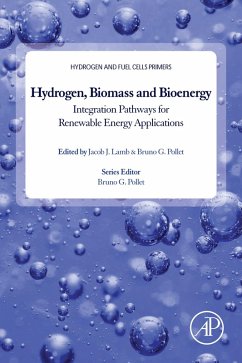Hydrogen and Bioenergy: Integration Pathways for Renewable Energy Applications focuses on the nexus between hydrogen and carbon compounds as energy carriers, with a particular focus on renewable energy solutions. This book explores opportunities for integrating hydrogen in the bioenergy value chain, such as adding hydrogen to upgrade biofuels and lower CO2 emissions during production. The book also takes the inverse path to examine hydrogen production by chemical and biological routes from various bioresources, including solid waste, wastewater, agricultural products and algae. This broad coverage of technologies and applications presents a unique resource for researchers and practitioners developing integrated hydrogen and bioenergy technologies.
This book will also be useful for graduate students and new researchers, presenting an introductory resource in the areas of hydrogen and bioenergy. Energy planners and engineers will also benefit from this content when designing and deploying hydrogen infrastructure for power, heating and transportation.
This book will also be useful for graduate students and new researchers, presenting an introductory resource in the areas of hydrogen and bioenergy. Energy planners and engineers will also benefit from this content when designing and deploying hydrogen infrastructure for power, heating and transportation.
- Provides a comprehensive picture of hydrogen generation from biomass, as well as other sources of hydrogen for power, heating, transportation and storage applications
- Explores the ways hydrogen can be utilized in combination with bio-derived hydrocarbon chains to produce a variety of substitutes for fossil fuel-based petrochemicals
- Fills the gap between theoretical knowledge and technology viability
- Analyzes how these technologies fit into an overall energy strategy targeted at expanding the renewable energy sector
Dieser Download kann aus rechtlichen Gründen nur mit Rechnungsadresse in A, B, BG, CY, CZ, D, DK, EW, E, FIN, F, GR, HR, H, IRL, I, LT, L, LR, M, NL, PL, P, R, S, SLO, SK ausgeliefert werden.

